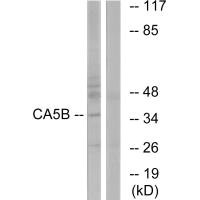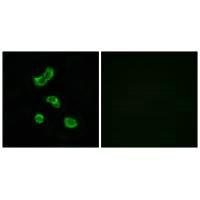CA5B Antibody
-
货号:CSB-PA039070
-
规格:¥2024
-
图片:
-
其他:
产品详情
-
产品名称:Rabbit anti-Homo sapiens (Human) CA5B Polyclonal antibody
-
Uniprot No.:Q9Y2D0
-
基因名:CA5B
-
宿主:Rabbit
-
反应种属:Human,Mouse,Rat
-
免疫原:Synthesized peptide derived from internal of Human CA5B.
-
免疫原种属:Homo sapiens (Human)
-
克隆类型:Polyclonal
-
纯化方式:The antibody was affinity-purified from rabbit antiserum by affinity-chromatography using epitope-specific immunogen.
-
浓度:It differs from different batches. Please contact us to confirm it.
-
产品提供形式:Liquid
-
应用范围:ELISA,WB,IHC,IF
-
推荐稀释比:
Application Recommended Dilution WB 1:500-1:3000 IHC 1:50-1:200 IF 1:100-1:200 -
Protocols:
-
储存条件:Upon receipt, store at -20°C or -80°C. Avoid repeated freeze.
-
货期:Basically, we can dispatch the products out in 1-3 working days after receiving your orders. Delivery time maybe differs from different purchasing way or location, please kindly consult your local distributors for specific delivery time.
相关产品
靶点详情
-
功能:Reversible hydration of carbon dioxide.
-
基因功能参考文献:
- In 10 of 96 patients, mutations in CA5A were identified on both alleles but none in CA5B. Exhibiting decreased enzyme activity or thermal stability, all CAVA mutations were proven to cause disease, whereas the three variants showed no relevant effect PMID: 26913920
- activators enhanced kcat, with no effect on KM, favoring the RDS in the catalytic cycle; the activation pattern of the two mitochondrial isoforms is very different from each other and as compared to those of the cytosolic isoforms hCA I and II. PMID: 17174092
-
亚细胞定位:Mitochondrion.
-
蛋白家族:Alpha-carbonic anhydrase family
-
组织特异性:Strongest expression in heart, pancreas, kidney, placenta, lung, and skeletal muscle. Not expressed in liver.
-
数据库链接:
HGNC: 1378
OMIM: 300230
KEGG: hsa:11238
STRING: 9606.ENSP00000314099
UniGene: Hs.653287
Most popular with customers
-
YWHAB Recombinant Monoclonal Antibody
Applications: ELISA, WB, IF, FC
Species Reactivity: Human, Mouse, Rat
-
Phospho-YAP1 (S127) Recombinant Monoclonal Antibody
Applications: ELISA, WB, IHC
Species Reactivity: Human
-
-
-
-
-
-






















